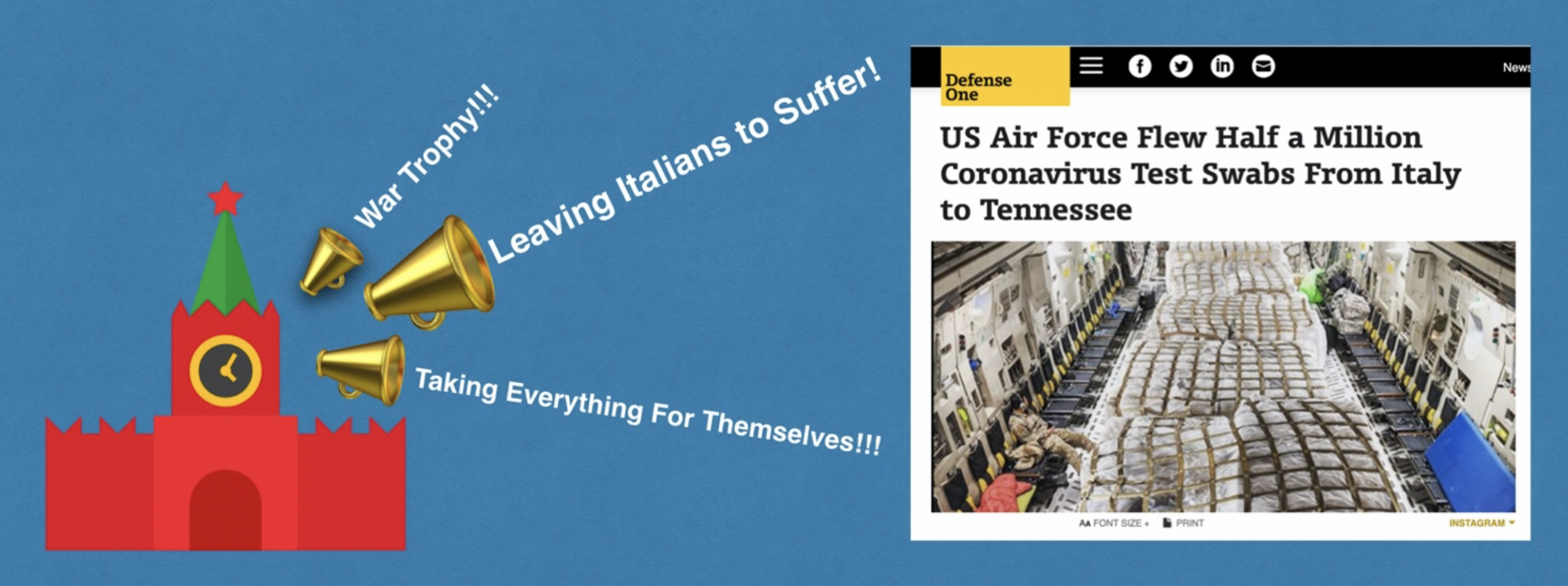Pro-Kremlin media spins story of U.S. military transporting COVID-19 test swabs from Italy
Story claimed a U.S. logistics operation transporting coronavirus test swabs amounted to taking away tests from Italians
Pro-Kremlin media spins story of U.S. military transporting COVID-19 test swabs from Italy

Story claimed a U.S. logistics operation transporting coronavirus test swabs amounted to taking away tests from Italians

In a continuing attempt to discredit the U.S. and the West amid the coronavirus pandemic, pro-Kremlin outlets put a misleading spin on the news that the U.S. military had transported 500,000 COVID-19 test swabs from Italy to the United States to meet increased U.S. demand. The outlets framed the operation as if the United States was taking tests away from “suffering” Italians. This story emerged as pro-Kremlin media and social media actors made efforts to draw positive attention to Russia’s humanitarian shipment of supplies to Italy, both in English-language information environments as well as domestic Russian-language media outlets.
On March 18, Defense One reported that the U.S. Air Force had transported half a million coronavirus test swabs from Italy to Tennessee. In an interview, Air Force Brig. Gen. Dr. Paul Friedrichswere said that the mission was “a great example of how nations are working together to ensure that we’re meeting the global demand.” Two days later, an article appeared on Business Insider claiming that United States had already transferred one million test swabs, adding that further logistical supply operations were expected. According to an analysis using the social listening tool Buzzsumo, the Defense One story garnered 53,000 engagements, and subsequent reporting amassed attention as well. Despite the high engagement rates, however, a CrowdTangle analysis did not suggest that any of the highly engaged Facebook posts were responding negatively to the story.

Pro-Kremlin media outlets saw an opportunity to frame the U.S. logistics operation as taking away tests from Italians who are in need of them. In all of these stories, the word “test” was used instead of “test swab,” ignoring the fact that the swabs are just one component of larger testing kit. These stories started surfacing in Russian-speaking media a few days after the Defense One article was published. They are a prime example of the second D of what the DFRLab often refers to as the 4 Ds of Disinformation framework. In this particular case, the D stands for distort — if you do not like the facts, twist them to suit your interests.
One of the first stories in response to the report of the operation was published on Ria.ru on March 21 with the headline, translated into English, “It’s war. Italy lacks virus tests — U.S. is buying them out.” The article stated that amid the coronavirus pandemic, a high-profile political scandal had erupted: the U.S. had taken away half a million test kits from Italy, while Italians were left feeling indignant and politicians keeping silent about it.

This narrative also picked up traction in Serbia. Two local niche media outlets, Iskra.co and in4s.net, called the operation “scandalous.” Combined, these two stories garnered close to 7,000 engagements on social media platforms. According to the story, the tests were stored only a few dozen kilometers from the epicenter of the coronavirus epidemic in Italy, yet they were not given to Italians.

One of the stories that garnered the most engagements — roughly 3,000 of them — was published on March 23 on RuBalitc.ru. The article’s title translates to “US takes away coronavirus tests from Europe instead of helping test-deficient Lithuania.” This pro-Kremlin outlet seemed to have taken the same narrative and switched out Italy for Lithuania.

The DFRLab also found several more examples that were not indexed by Buzzsumo. On March 21, Monavista published a story “Italy lacks virus tests because they were bought by the USA.” The story claimed the U.S. buying up the tests was the prime reason for Italy’s shortage. On the same day, OSNmedia.ru published “War trophy’ or ‘Helping allies?’ US takes away coronavirus tests from Italy.” The story presented the cargo as a “war trophy” and included a photo of a painting of Russian peasants paying tribute to Mongol invaders. Lastly, on March 20, tsargrad.tv posted an article titled “They took the entire reserve for themselves: the US military left Italy without tests for coronavirus.” The story claimed that in the midst of the coronavirus pandemic, the United States bought coronavirus tests from Italian businessmen, leaving none for Italy.
Pro-Kremlin media seized the opportunity to smear NATO, the United States, the European Union, and other rivals experiencing the coronavirus pandemic. It has been particularly active in Italy, one of the world’s hardest-hit countries: the DFRLab has previously reported on how pro-Kremlin and fringe outlets spread an anti-NATO narrative suggesting that U.S. troops in Italy may have been infected by the virus, and thus posed a health risk to other NATO forces.
Follow along for more in-depth analysis from our #DigitalSherlocks.

